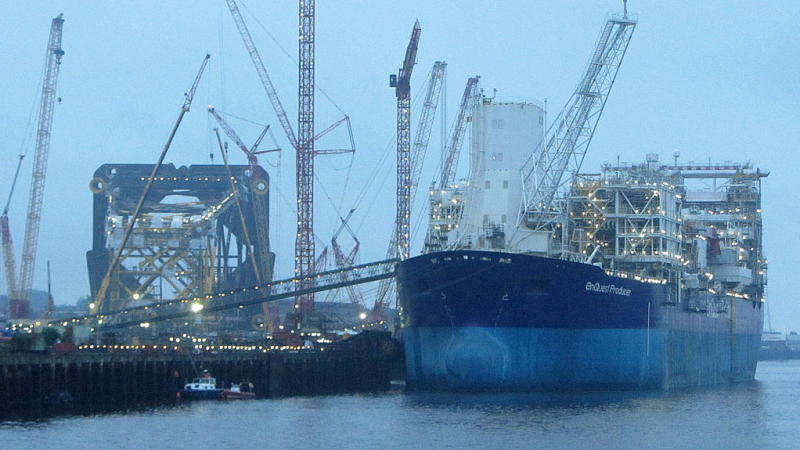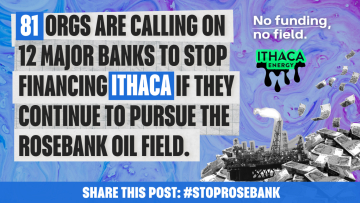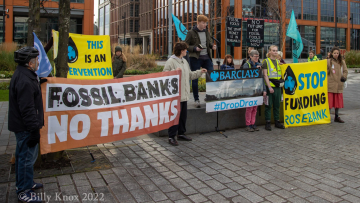Project – On record
This profile is no longer actively maintained, with the information now possibly out of dateBankTrack

Project – On record
This profile is no longer actively maintained, with the information now possibly out of dateBankTrack
Why this profile?
No project expanding the fossil fuel industry is compatible with the Paris Climate Agreement. Rosebank is the largest undeveloped oil and gas field in the North Sea, with emissions that would be higher than those of all the low-income countries in the world combined.
Also, a proposed pipeline through Rosebank would cross a marine protected area, damaging the fragile ecosystem in this area of the North Sea.
What must happen
Banks should rule out direct financing for the Rosebank project. Banks financing Equinor should engage with the company and urge it to terminate this project, halt fossil fuel expansion and ultimately phase out production in line with the Paris Agreement’s 1.5C goal. Banks should sever ties with Equinor if it fails to make rapid progress towards this goal.
| Take Action! |
| #StopRosebank |
| Sectors | Oil and Gas Extraction |
| Location |
|
| Status |
Planning
Design
Agreement
Construction
Operation
Closure
Decommission
|
The Rosebank oil and gas field is located in the North Sea, 130 kilometres off the coast of the Shetland Islands. It contains an estimated 500 million barrels of oil equivalent (according to Rystad Energy data). The field would be developed by Equinor, which holds a 80% stake. The other owner is Ithaca Energy (20%).
In September 2023, the UK government approved the development of the Rosebank oil field.
Impact on human rights and communities
Rosebank will contribute to multiple human rights violations as a result of climate change. Rosebank is the largest undeveloped oil and gas field in the North Sea, and like all fossil fuel expansion projects it will contribute to driving global heating. As such, the human rights to life, water and sanitation, health, food, a healthy environment, an adequate standard of living, housing, property, culture, self-determination and development will be violated for countless individuals. As the 2021 landmark court ruling against Shell confirmed, fossil fuel companies are a major cause of catastrophic climate change that puts people’s lives at risk and thereby violate basic human rights. Climate change caused by the fossil fuel industry particularly threatens the rights of women, indigenous communities and all communities on the frontlines of fossil fuel extraction.
Oil and gas production in the North Sea has been billed as the solution to the current energy crisis and war in Ukraine. However, fossil fuel expansion in the North Sea will not provide energy security or affordable prices for UK citizens. Not only is the majority of North Sea oil & gas exported, but new fields will take years to be developed, and lock the UK into? fossil fuel insecurity.
Impact on climate
Climate-related catastrophes will be exacerbated by Rosebank, because it represents an expansion of the fossil fuel industry. In 2021, the International Energy Agency stated there is “no need for investment in new fossil fuel supply in our net zero pathway”. Developing a massive new field like Rosebank is therefore clearly incompatible with limiting the global temperature rise to 1.5C. Rosebank is the largest undeveloped oil and gas field in the North Sea, estimated to contain approximately 500 million barrels of oil equivalent according to Rystad Energy data. Its emissions would be more than the combined emissions of all low income countries in the world.
Equinor may seek to finance development of the Rosebank oil and gas field through project finance lending or from its own capital. Between 2016 and 2021, 16 commercial banks financed Equinor through lending and bonds issuance underwriting totalling US$16.22 billion.
In May 2021 Equinor signed a USD 6 billion revolving credit facility, financed by 19 commercial banks, maturing in May 2024.
RBC (0.8%) and DNB (0.6%) hold shares in Equinor via their asset management subsidiaries.
See the Equinor dodgy deal for more details of bank finance for the company.
The two shareholders of the project are Equinor and Ithaca Energy.
2023
2023-09-27 00:00:00 | The UK Government approves the development of Rosebank
On September 26, the UK oil and gas regulator has approved the Rosebank field development plan, which allows Equinor and Ithaca Energy to proceed with the project.
2023-07-11 00:00:00 | Approval for Equinor's Rosebank oil field delayed amid concerns over UK's net zero goals
Regulatory approval for Equinor's North Sea oil field Rosebank was expected for early 2023. However, in July it was reported that the UK’s largest undeveloped oil and gas field is highly unlikely to be approved in time for parliamentary recess, amid growing concerns from regulators over electrification and net zero compatibility across the industry. Read more on CityAM.
2022
2022-08-04 00:00:00 | Application for Rosebank approval
Equinor has submitted an application to the UK government for the approval of the Rosebank oil and gas field.




